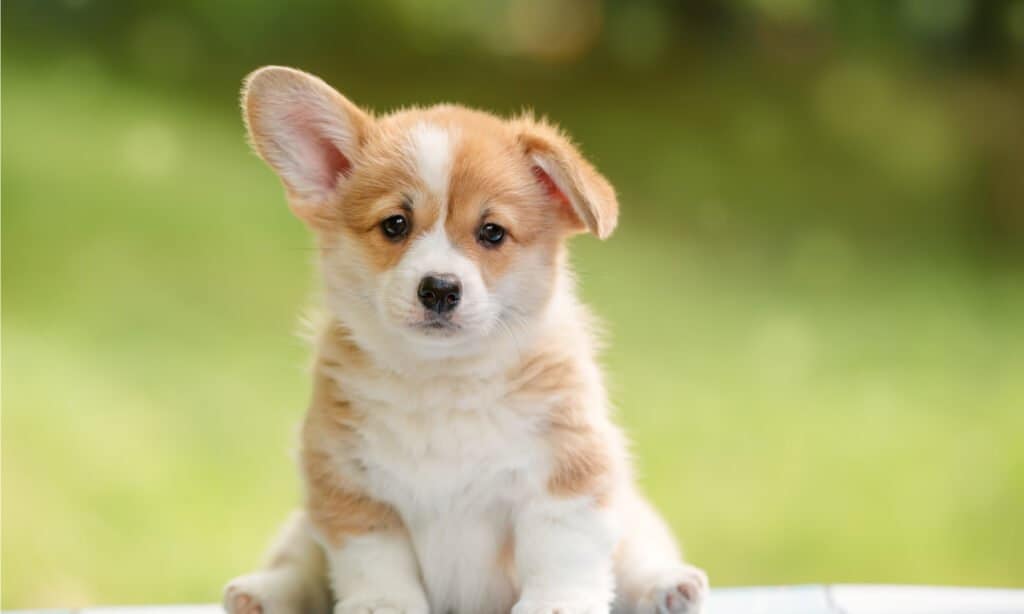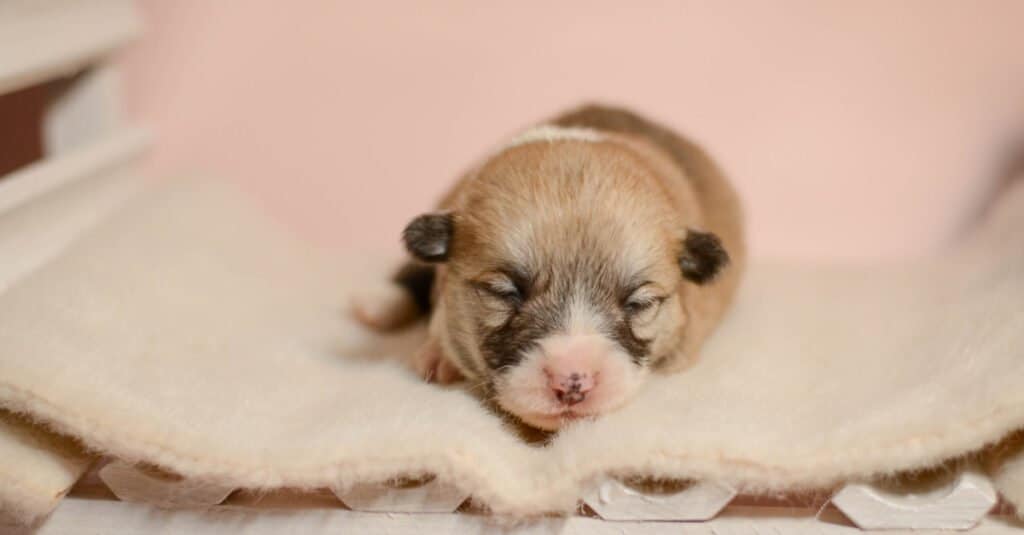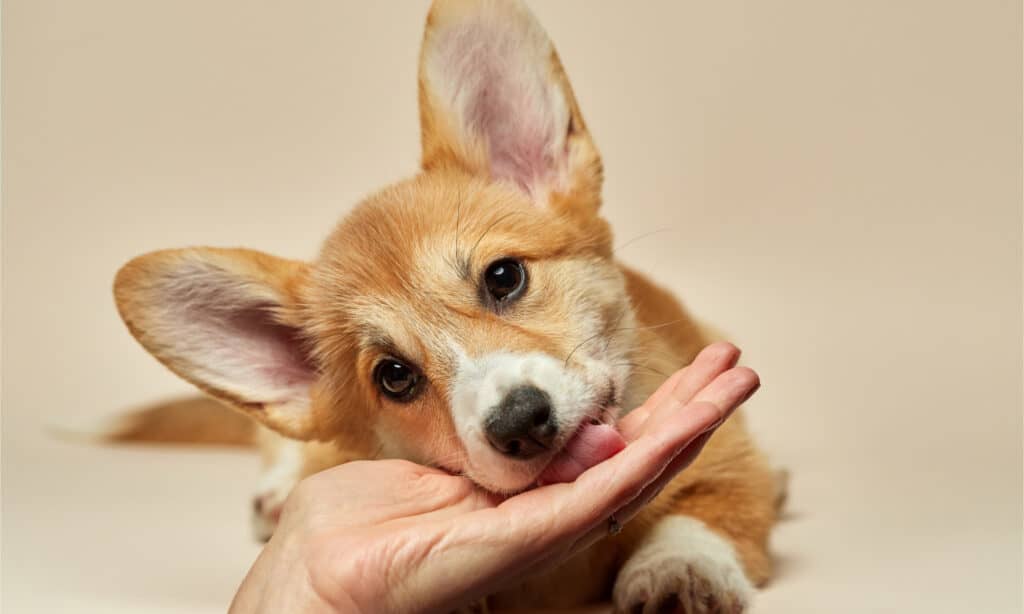Corgis are absolutely adorable with their short legs and long bodies. Their puppies are even more adorable. There isn’t much that beats a Corgi puppy when it comes to cuteness.
However, you shouldn’t run out and adopt a Corgi puppy because it is cute. Instead, you need to do the proper research and understand exactly what these dogs need to thrive. Adopting a puppy is a huge responsibility, and a Corgi puppy is no different.
We’ll go over everything you need to know in this article, including adoption tips and pricing.
Pictures of Corgi Puppies

This is a Pembroke Corgi, one of the two Corgi breeds.
©Natalia Fedosova/Shutterstock.com

This newborn Corgi puppy will need to stay with its mother for another 12 weeks.
©Oksamutnaya/Shutterstock.com
Adoption Tips
Adopting a Corgi puppy from a reputable breeder is vital. While these dogs are pretty sturdy, they can be prone to some health issues. Therefore, it’s vital that you get your puppy from a breeder that performs the proper health testing. Often, these breeders are more expensive, but you’re paying for the extensive health testing they perform.
Deciding exactly which breeders are high-quality and which aren’t can be challenging. We recommend looking for breeders who are members of reputable organizations, like the American Kennel Club or the Pembroke Welsh Corgi Club of America. These breeders have to follow certain guidelines, especially if they are part of the PWCCA.
When possible, visit the breeder to meet the parents and see where the puppies are raised. Not all breeders make this possible, but not allowing you to at least see the facilities is a sign that something may be “off.” If a breeder doesn’t want you to see where the puppies are, there is probably a reason!
Quality breeders will ask for references from potential owners and try to match their puppies’ temperaments with prospective owners. Breeders that don’t do any of these things may be easier to adopt from. However, breeders who care about their dogs won’t give their puppies to just anyone.
What to Look for in a Corgi Puppy
When you meet your potential Corgi puppy, you should do your best to ensure that the puppy is healthy. Preferably, your puppy should have a bright, alert expression. Their eyes and coat should be clean and maintained. They should be friendly, as quality breeders would have already started socialization.
However, some dogs may be more laidback and skittish than others. Some fear may simply be a sign of a different temperament.
You should be able to comfortably handle any puppy without it showing signs of aggression. Often, this is a sign of poor breeding or no socialization.
How to Prepare Your Home for a New Puppy
Before bringing your puppy home, you should puppy-proof the house by removing hazards. Electrical cords, poisonous plants, and small objects are all common dangers.
Designate a room for your puppy. In the beginning, you’ll only want your puppy to be in a specific area to help with potty training. Your puppy should be able to eat, sleep, and play in this area.
You should also purchase all necessary supplies, such as food, a crate, and toys. Have these things set up before you bring your puppy home.
Additional Adoption Tips
There are many wonderful Corgis at rescues and shelters. Consider adopting one of these dogs instead of searching for a puppy. These dogs often come from difficult backgrounds, but they are just as deserving of love and a good home as any other dog. However, they can be a bit much for new owners to handle, so always be sure to get a complete history from the organization (and look at it honestly).
You may be asked questions about your lifestyle and home by the office staff. Adopting from a rescue is sometimes even harder than adopting a puppy. Don’t assume that the process will be easier or shorter.
Bringing Home Your New Corgi Puppy
When you bring home your new Corgi puppy, be sure to give your puppy plenty of time to adjust to the new home. Don’t overwhelm your puppy with too much attention or too many changes at once. Keep your puppy only in one area of the house, as this helps them acclimate more easily.
Feed, walk, and play with your puppy at the same time each day. This will help your puppy feel settled and secure. Establishing a routine helps ensure that the puppy knows what will happen when and can also help with potty training.
As soon as you bring your puppy home, start training. Corgis are intelligent and eager to please, so they’re often easy to train. However, your dog will start learning when they enter your house. If you aren’t teaching them how they should behave, they’re likely to pick up on bad habits.
You should also begin socializing your puppy right away. This involves exposing them to a variety of people, places, and animals at a young age. This prevents these experiences from being new and scary when they get older, which can cause aggression.
More About Corgi Puppies
Corgi Puppy Training Tips
Corgis are relatively intelligent and often easy to train. However, it’s still important to train them correctly for the best results. Here are some tips to keep in mind:
- Use positive reinforcement. It’s best to use positive reinforcement when training your Corgi. This involves using rewards to encourage good behavior, such as treats and praise.
- Be patient and consistent. It may take some time for your puppy to learn new commands. Be patient and consistent with your training, and your puppy will eventually learn.
- Keep sessions short. You should keep the training sessions at only ten minutes long max. You can train several times a day, though, to reach your goals faster.
- Keep it fun. If training feels like a chore, your dog is less likely to do it. You should use treats and games to keep training interesting.
Corgi Puppy Health and Care
Corgis are generally healthy dogs. However, they are prone to a few health problems. Some of these develop in puppyhood, so they’re important to be aware of.
- Hip Dysplasia: This condition occurs when the hip doesn’t develop at an even rate, causing wear and tear. A puppy’s diet plays a huge role in this condition, so be sure not to overfeed your dog. Genetics can also play a role, though.
- Elbow Dysplasia: Elbow dysplasia is not as common as hip dysplasia, but it is basically the same thing – only in the elbows. Choosing a quality breeder that does health testing can help prevent this condition.
- Von Willebrand’s disease: This genetic condition affects blood clotting. It can cause excessive bleeding in dogs, which can potentially be fatal.
Take your puppy to the vet regularly and get them all the recommended vaccinations. This can prevent many serious conditions.
Here are some tips to keep your puppy healthy:
- Feed a high-quality diet. Be sure to give your puppy a food formulated specifically for puppies. Feed it to them until they stop growing.
- Don’t forget exercise. You don’t want to exercise your puppy too much, as this can cause hip dysplasia. However, you should provide your dog with about 30 minutes of exercise a day to keep them healthy.
- Keep them brushed. Corgis need a little bit of brushing a few times a week to remove dead hair and prevent matting.
- Trim your puppy’s nails. Your puppy’s nails will grow continuously, and they must be trimmed regularly to prevent painful splitting.
Cost of Corgi Puppies

Compared to other medium-sized dogs, Corgis are very expensive.
©BONDART PHOTOGRAPHY/Shutterstock.com
Corgis are one of the more expensive dog breeds out there. On average, Corgi puppies from reputable breeders cost between $1,000 and $2,000. However, some puppies can cost more than $3,000, especially if they are from champion bloodlines or have rare coat colors.
If you are considering adopting a Corgi puppy from a shelter or rescue organization, the cost will be significantly lower, typically around $250 to $600.
However, it’s important to note that rescue organizations rarely have puppies. If you’re set on a puppy, you’ll likely need to purchase from a quality breeder instead. Plus, many rescue Corgis may come with behavioral issues or health problems, which can make them cost more over their lifetime.
You should be prepared to spend quite a bit on your puppy. On top of purchasing the actual puppy, you’ll also need to purchase all the stuff your puppy needs. We have a complete guide to Corgi costs you can take a look at.
Growth and Milestones of Corgi Puppies
Corgi puppies grow rapidly during their first year of life. Corgis typically need to stay with their mother until around 10 to 12 weeks of age. Not only do they need their mother’s milk, but staying with their littermates also helps them become well-socialized. Many breeders will begin training during this time, though you will need to continue it at home.
Corgi puppies should begin training by around 8 weeks. They should be well-socialized by around 12 weeks old, though socialization should continue into adulthood and even after that.
Plan on housebreaking your puppy by around 16 weeks old. Most puppies are ready for most complex commands by around 20 weeks.
It is important to note that all puppies develop at their own pace. Some puppies may reach these milestones earlier or later than others. If you have any concerns about your puppy’s development, be sure to talk to your veterinarian.
For more information on how these dogs progress, see our complete guide on the subject.
The photo featured at the top of this post is © iStock.com/Nataba
Ready to discover the top 10 cutest dog breeds in the entire world?
How about the fastest dogs, the largest dogs and those that are -- quite frankly -- just the kindest dogs on the planet? Each day, AZ Animals sends out lists just like this to our thousands of email subscribers. And the best part? It's FREE. Join today by entering your email below.
Thank you for reading! Have some feedback for us? Contact the AZ Animals editorial team.






